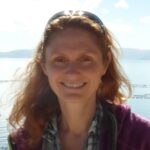MESGOUEZ GAELLE

Subjects taught
- Polymers: general knowledge, origin and synthesis, thermosets, thermoplastics, the main families, macromolecules and molecular arrangement
- Polymers: polymer synthesis (chain polymerisation, polycondensation), mechanical properties of polymers
- Paper / Cardboard / Wood: paper structure, pulp manufacture, single-jet and multi-jet technologies, chemical and mechanical treatments, properties of flat paper and cardboard, friction, corrugated cardboard, case compression (MacKee formula).
- Design: help with the design of cardboard boxes and cases, introduction to Artioscad software specifically for the design and drawing of cases and boxes, practical work on a prototype cutting table.
Structure(s)
Laboratory or team
UMR 1114 EMMAH - Mediterranean Environment and Modelling of Agrohydrosystems
Component and department
CER Physics
Institute of Agrosciences, Environment and Health
Research topics
Research theme 1: Development of semi-analytical tools for solving problems based on partial differential equations for comparison with numerical and/or experimental resultsSemi-analytical tools are integral approaches that combine theoretical developments, leading to an analytical solution, with numerical calculation. They provide a better understanding of the physical phenomena associated with problems modelled by partial differential equations. They also provide benchmarks, both for validating calculation codes and for comparison with experimental results. In this context, we are particularly interested in the study of transient regimes (e.g. half-sine or Ricker wavelet excitation), or permanent regimes (e.g. harmonic loads, continuous infiltration). Our approaches use the following concepts: Helmholtz decompositions, Fourier or Hankel transforms on space variables, time Fourier transform for the transient regime, conditioning of matrix systems, resolution of algebraic systems. The solution, possibly in matrix and/or integral form, is obtained in the Fourier / Hankel transform domain (wave number - frequency). The return to the space-time domain is then performed numerically using an inverse Fast Fourier Transform (IFFT) algorithm or a Filon-type algorithm, in particular to manage the Hankel integral in axisymmetric problems. Key words: waves, Helmholtz decomposition, Fourier transforms, Filon integration, Hankel integral, elasticity, poroviscoelasticity, flow in porous media, Biot theory, inverse problems. Research theme 2: Development of a FAFEMO digital simulation platform A FAFEMO (Fast Adaptive Finite Element Modular Object) numerical simulation tool programmed in object-oriented C++ is being developed and maintained within the UMR EMMAH. The numerical management of the differential equations governing the 2D or 3D problem to be simulated is approached using finite elements in space and finite differences in time. The time resolution algorithms are specific to each type of physical problem dealt with, but retain the object structure of the code. The FAFEMO digital platform consists of 5 objects, each corresponding to a key stage in the finite element method and its temporal resolution: i) management of the mesh (Gmsh, Gid, Tecplot, etc.), boundary conditions and initial conditions of the simulated physical problem; ii) T3 or TH4 element object; iii) elementary matrices object of the physical problem; iv) assembly; v) temporal resolution algorithms of order 1 or 2 in time. The platform offers the following capabilities: management of linear or non-linear problems, efficient algorithm for solving linear systems by hollow storage, LU decomposition or iterative resolution (conjugate gradient, pre-conditioning, etc.) ad-hoc, interfacing with optimised libraries of the PETSC type. In order to tackle the modelling of realistic 3D problems with a large number of degrees of freedom (of the order of a million), parallelization by domain decomposition is effective. It uses an SPMD-type model in MPI and has been tested on Jade at the Centre Informatique National de l'Enseignement Supérieur (CINES). Key words: finite elements, finite differences, linear and non-linear problems, parallel calculation, coupled problems, code coupling.
Biography
- Since 2000: Lecturer at the University of Avignon, UMR EMMAH, IUT d'Avignon, Packaging and Conditioning Department (PEC).
- Habilitation à Diriger des Recherches, defended on 12 June 2015 at the University of Avignon before the following jury: M.C. Néel -President-, A. Chabot, O. Laghrouche, J.F. Semblat -Rapporteurs-, C. Petit, G. Micolau -Examinators-. Title: Contribution to the study of heterogeneous porous media: applications to wave propagation and transfers in soils.
- September 1999 - August 2000: part-time Temporary Teaching and Research Assistant (ATER), Université de Bretagne Sud (UBS) - Lorient.
- November 1996 - August 1999: MNERT research fellow
- Doctoral thesis in Mechanical Engineering from the University of Nantes defended on 9 November 1999 at the Ecole Centrale de Nantes before the following jury: F. Darve -President-, M. Deschamps, L. Jézéquel, G. Schmid -Rapporteurs-, P.E. Gautier, P. Jouve, D. Le Houédec, A. Peplow, G. Rio -Examinators-. Title : Wave propagation in a solid body subjected to charges moving at constant speed.
- 1996: Diplôme d'Etudes Approfondies de Mécanique et Energétique, option Mécanique, ENSEM - Université de Nancy I, summa cum laude.
- 1996: Engineering degree from the Ecole Nationale Supérieure d'Electricité et de Mécanique de Nancy (ENSEM).
- 1993-95: Ecole Nationale Supérieure d'Electricité et de Mécanique de Nancy. Bachelor's and Master's degrees in Mechanics, University of Nancy I, with honours.
- 1990-93: Classes préparatoires aux "Grandes Ecoles", lycée Henri Bergson, Angers. Deug SSM, University of Angers, summa cum laude.
Updated on 24 September 2024